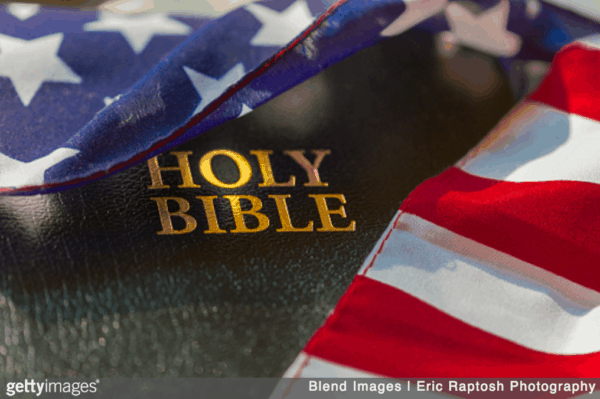Is religious freedom in peril in the United States? Is Trump’s executive order its salvation? Or is religious liberty a cover for bigotry and intolerance?
Trump campaigned as the voice of religion against secularism, and his new executive order certainly reflects that priority: it directs the IRS not to enforce the Johnson Amendment, and moreover would offer “regulatory relief” for conscientious objectors to the contraceptive mandate of the Affordable Care Act.
Just what is the Johnson Amendment? NCR’s Father Reese puts it well:
The Johnson Amendment is named after then-Sen. Lyndon B. Johnson, who was upset that a tax-exempt organization was supporting his opponent during an election. In response, he offered what became known as the Johnson Amendment in 1954, which prohibited nonprofit 501(c)(3) tax-exempt organizations from participating in campaigns for political office. If a tax-exempt organization violates this prohibition, it can lose it tax-exempt status, which means it would be subject to taxation and donations to it would not be tax-deductible.
The Amendment’s origins, which sound a bit like an Opposite Day version of Henry VIII’s founding of the Church of England, have always raised eyebrows, but the real fight has been over principles. For some critics, the Johnson Amendment is an “an illiberal hat-trick undermining the Free Speech Clause, Free Exercise Clause, and Establishment Clause.” For others, it is a vital dimension of the “separation of Church and state.”
What is the likely impact of the order? It’s unclear, but possibly not much. As Reese notes, the IRS has rarely enforced the Johnson Amendment. So defanging the Amendment might not change much of the IRS’ activity. What will be interesting, however, is how churches respond to it… Will it embolden some to become more politically active? And how will politicians respond? Even if getting in the electioneering game is bad for churches, politicians will have a great deal to gain from encouraging churches to do just that.
The provisions for conscientious objectors to the contraception mandate is similarly weak tea:
The Secretary of the Treasury, the Secretary of Labor, and the Secretary of Health and Human Services shall consider issuing amended regulations, consistent with applicable law, to address conscience-based objections to the preventive-care mandate
The bigger question, however, is how this order fits into Trump’s broader administration. Is the Trump administration really serious about cultivating religious liberty broadly so that believers can live out all the teachings of the Gospel? Or is the administration rather interested in scoring political points by advancing the select causes that make the headlines and please conservative elites?
American Public Theology
The merits of Trump’s executive order are disputable. But one thing is certain: religious liberty is a partisan issue in our time. It has seemed to many that religious liberty conflicts with gay rights, or that it is primarily the weapon of conservatives against liberals. Indeed, even most religious Americans are opposed to allowing businesses to refuse services to gay or lesbian persons for religious reasons.
To complicate matters, Americans disagree on the status of religion in the U.S. While once Protestants felt complacent and Catholics were on edge, now evangelical Protestants are more likely than Catholics to see widespread cultural hostility to religion.
In other words, the very idea of religious liberty has become contentious. For many U.S. Catholics, what religious liberty means depends upon their political ideology. But for even more Americans, religious liberty is at best unimportant and at worst a cover for power.
What are we to do in this situation? First, we must recognize that no law is going to settle these disputes about the proper place of religion in public life. Profound shifts in public opinion on religion are underway, and President Trump is not going to change that. Indeed, those who think Trump can somehow save the religious liberty agenda have evidently not seen his approval numbers.
Second, a new conversation in our time about religious liberty is all the more urgent: what is the role of religion in public life, and how do we preserve the liberty of everyone involved? To propose a dialogue, however, is to ask people to get out of their trenches and sit down at the table.
For Catholics’ part, we have much to rethink. The average American Catholic probably thinks that the First Amendment was issued by the Vatican. Indeed, U.S. Catholics are more likely to imbibe their Church-State opinions from American constitutional history than from other Church teaching: from the First Amendment, from Thomas Jefferson’s “wall of separation,” and perhaps most importantly from the post-war Catholic effort to integrate into Protestant America. That integration, like so much in American life, has spun off into left- and right-leaning movements.
There are powerful reasons why conservative Catholics think religious liberty is a problem in this country, and liberal Catholics do not. For many Catholics and Christians more committed to action and social justice, government policies should be judged in terms of their effects upon the poor and marginalized. But Catholics and Christians more committed to life issues are more likely to judge government policies in terms of their effects upon religious organizations. To take an obvious example, the Catholics who were worried about whether “Obamacare” would increase access to health care were not often the same Catholics worried about how it would affect the Little Sisters of the Poor. Overcoming our divides over religious liberty, then, requires us to confront ideological divisions within the church.
***
It’s hard to believe this now, but John Courtney Murray, SJ described the Religion Clauses as “articles of peace”: they have served to ensure peace between religious groups and protect government and religious bodies from one another. But do the Religion Clauses of the First Amendment still function as “articles of peace”?
And what is the Catholic teaching on the subject? Or, more fundamentally, where would one begin with the question if one didn’t have the First Amendment to rely upon? Where would one begin if the population were no longer primarily Catholics and various Protestant groups, but people of all faiths and none? And where would we begin if the question were not only liberty, but also equality: how can we invoke religious liberty in ways that respect the rights of others?
And so we are back to John Courtney Murray. The solution to our problems cannot just be political: it must be cultural and social.


